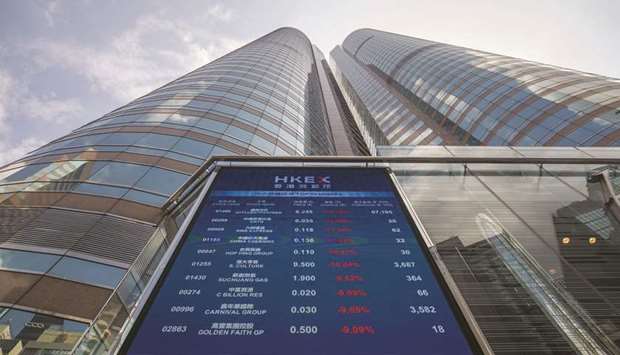A new China-US flare-up sent markets tumbling yesterday, while the mood was also soured by US lawmakers’ struggles to agree on a new economic stimulus — all against a backdrop of surging virus infections.
China-US tensions were back on traders’ minds after President Donald Trump signed an executive order barring US residents from doing any business with the Chinese parent companies of social media platforms TikTok and WeChat, citing national security concerns.
The move, which comes into force in 45 days, is the latest salvo in a tech stand-off between the superpowers and adds to a laundry list of issues they have butted heads over in recent months, including Hong Kong, Huawei and the coronavirus.
WeChat parent Tencent sank 10% at one point in Hong Kong before ending almost 6% off, while the city’s Hang Seng Index dropped.
The yuan also took a hit against the dollar. “The US government is expected to follow up with more measures targeting Tencent,” Steven Leung, at UOB Kay Hian (Hong Kong), said. “Tencent’s overseas expansion map now looks a bit uncertain, since some M&A deals, especially if its targets are based in the US, will face challenges.”
The move rippled around Asian markets, with investors concerned about increasingly bitter relations between the economic titans that some fear could lead to a renewal of their painful trade war.
China accused the US of “arbitrary political manipulation and suppression” and said it came at the expense of US users and companies.
The news overshadowed data showing a surprise jump in Chinese exports for July. Hong Kong dived 1.6% and Shanghai dropped 1%, while Tokyo finished 0.4% lower.
Wellington and Jakarta gave up 1%, while Sydney, Mumbai, Taipei, Singapore, Manila and Bangkok were also in the red.
Seoul edged up, however.
In early trade London was flat, while Paris and Frankfurt were lower.
“Apart from the obvious fallout to Tencent and ByteDance, Washington DC’s moves are sure to ratchet up geopolitical tensions with Beijing once again,” said OANDA’s Jeffrey Halley.
Meanwhile, a group of regulators working for Trump suggested stock exchanges impose stricter rules on firms to open up their audit papers to US accountants, which could lead to the delisting of Chinese companies.
In Washington, the bipartisanship that passed a multi-trillion-dollar rescue package earlier this year has given way to the familiar Capitol Hill wrangling as Democrats and Republicans refuse to budge on key issues. With the Democrats’ $3.5tn proposal more than three times the size of the Republicans’ offer, a deal appears a distant hope, despite a Friday deadline.
“There are a lot of issues we are close to a compromise position on,” Treasury Secretary Steven Mnuchin said after holding talks with House Speaker Nancy Pelosi and Senate Democratic leader Chuck Schumer.
However, he added they were “very, very far apart on some significant issues.”
The sentiments were shared by Pelosi, who described the situation as “most unfortunate”. While there is a broad expectation among traders and analysts that a deal will eventually be struck — particularly three months before an election — concerns remain.
“In an election year, it is crazy to think that politicians will take a fabulously frugal approach as penniless parenting is rampant across the nation given the services sector beat down and loss of jobs” because of the virus, said AxiCorp’s Stephen Innes.
Trump has said if an agreement is not found, he will pass an executive order covering a payroll tax cut, eviction protections, unemployment benefits and student loan repayments.
The battle in Congress comes as the US reported more than 2,000 coronavirus deaths on Thursday — the first time it has done so in three months.
The next point of focus is the US jobs report due Friday, which will provide a clearer idea about the impact of the virus on the economy after a number of states reimposed lockdown measures to fight a fresh infection spike.
While figures Thursday showed new applications for jobless benefits began to fall again last week, the 1.2mn figure showed the economy is still struggling.
In Tokyo, the Nikkei 225 closed down 0.4% to 22,329.94 points; Hong Kong — Hang Seng ended down 1.6% to 24,531.62 points and Shanghai — Composite closed down 1.0% to 3,354.04 points yesterday.

A screen displays stock figures outside the Hong Kong Stock Exchange. The Hang Seng closed down 1.6% to 24,531.62 points yesterday.
